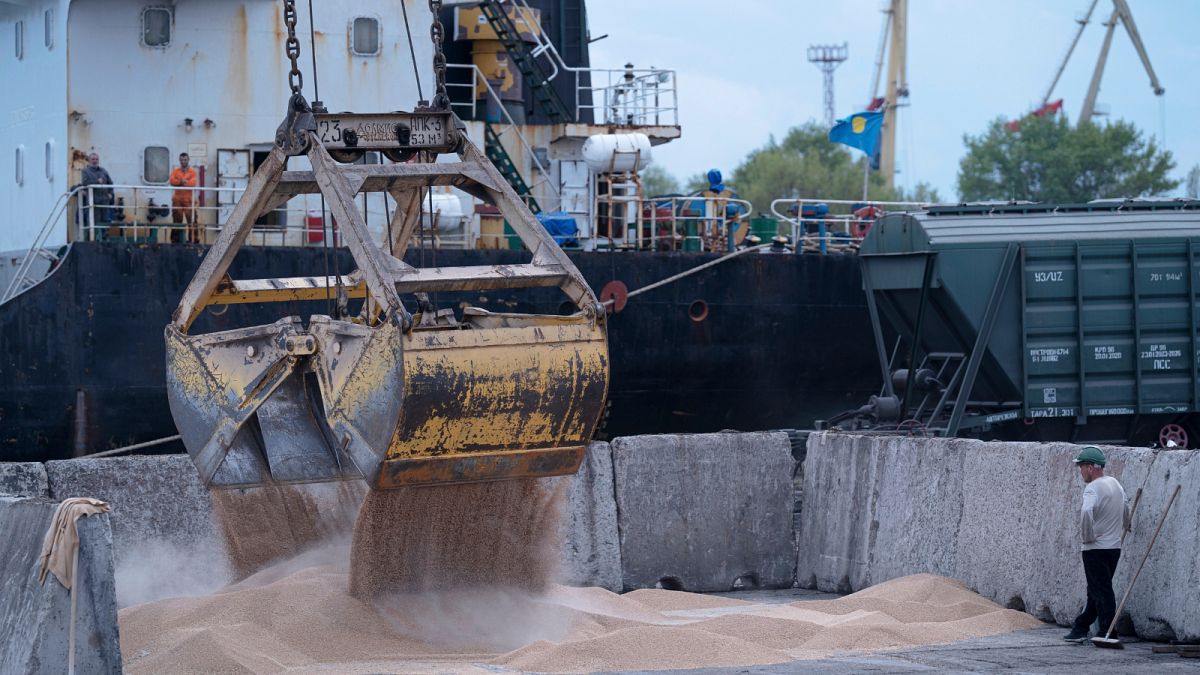Russia said on Monday it has halted an unprecedented wartime deal that allows grain to flow from Ukraine to countries in Africa, the Middle East and Asia where hunger is a growing threat and high food prices have pushed more people into poverty.
Russia's announcement on Monday that it would end the agreement on the export of Ukrainian grain has provoked a cascade of reactions from the international community.
The head of European diplomacy, Josep Borrell, called the move "unjustified" and accused Moscow of "turn[ing] people's hunger into a weapon".
"This is something very serious that will create a lot of troubles for many people around the world," Borrell told reporters in Brussels.
Turkish President Recep Tayyip Erdoğan, however, said he still believes Russian President Vladimir Putin wants the Black Sea grain deal to continue.
"Despite today's statement, I believe that the President of the Russian Federation, my friend Mr Putin, wants this humanitarian bridge to continue" he said, referring to the initiative that allows the export of Ukrainian grain to the Black Sea, and which is due to expire at 21.00h GMT on Monday evening.
The United States ambassador to the United Nations pulled no punches, calling Russia's withdrawal from the agreement "cruel" and accusing Moscow of holding "humanity hostage."
"While Russia plays political games, real people will suffer," Linda Thomas-Greenfield told reporters at the United Nations headquarters in New York.
UN Secretary-General Antonio Guterres said that Russia's decision to exit the Ukraine grain deal will "strike a blow to people in need everywhere."
"Hundreds of millions of people face hunger and consumers are confronting a global cost-of-living crisis. They will pay the price," added Guterres.
What has happened with the Black Sea grain deal?
Russia said on Monday it has halted an unprecedented wartime deal that allows grain to flow from Ukraine to countries in Africa, the Middle East and Asia where hunger is a growing threat and high food prices have pushed more people into poverty.
Kremlin spokesman Dmitry Peskov announced halting the deal in a conference call with reporters, adding that Russia will return to the deal after its demands are met.
“When the part of the Black Sea deal related to Russia is implemented, Russia will immediately return to the implementation of the deal,” Peskov said.
It’s the end of a breakthrough accord that the United Nations and Turkey brokered last summer to allow food to leave the Black Sea region after Russia invaded its neighbour nearly a year and a half ago. A separate agreement facilitated the movement of Russian food and fertiliser amid Western sanctions.
The warring nations are both major global suppliers of wheat, barley, sunflower oil and other affordable food products that developing nations rely on.
Russia has complained that restrictions on shipping and insurance have hampered its exports of food and fertiliser -- also critical to the global food chain.
But analysts and export data say Russia has been shipping record amounts of wheat and its fertilisers also have been flowing.
The agreement was renewed for 60 days in May amid Moscow's pushback. In recent months, the amount of food shipped and number of vessels departing Ukraine have plunged, with Russia accused of limiting additional ships able to participate.
What impact has the war in Ukraine had on global food prices?
The war in Ukraine sent food commodity prices surging to record highs last year and contributed to a global food crisis also tied to conflict, the lingering effects of the COVID-19 pandemic, droughts and other climate factors.
High costs for grain needed for food staples in places like Egypt, Lebanon and Nigeria exacerbated economic challenges and helped push millions more people into poverty or food insecurity.
People in developing countries spend more of their money on meals. Poorer nations that depend on imported food priced in dollars also are spending more as their currencies weaken and they are forced to import more because of climate issues. Places like Somalia, Kenya, Morocco and Tunisia are struggling with drought.
Prices for global food commodities like wheat and vegetable oil have fallen, but food was already expensive before the war in Ukraine and the relief hasn't trickled down to kitchen tables.
“The Black Sea deal is absolutely critical for the food security of a number of countries,” and its loss would compound the problems for those facing high debt levels and climate fallout, said Simon Evenett, professor of international trade and economic development at the University of St. Gallen in Switzerland.
He noted that rising interest rates meant to target inflation as well as weakening currencies “are making it harder for many developing countries to finance purchases in dollars on the global markets.”
What did the grain deal mean in practice?
The Black Sea Grain Initiative has allowed three Ukrainian ports to export 32.9 million metric tons of grain and other food to the world, more than half of that to developing nations, according to the Joint Coordination Center in Istanbul.
But the deal has faced setbacks since it was brokered by the UN and Turkey: Russia pulled out briefly in November before rejoining and extending the deal.
In March and May, Russia would only extend the deal for 60 days, instead of the usual 120. The amount of grain shipped per month fell from a peak of 4.2 million metric tons in October to 1.3 million metric tons in May, the lowest volume since the deal began.
Exports expanded in June to a bit over 2 million metric tons, thanks to larger ships able to carry more cargo.
Ukraine has accused Russia of preventing new ships from joining the work since the end of June, with 29 waiting in the waters off Turkey to participate in the initiative. Joint inspections meant to ensure vessels only carry grain and not weapons that could help either side also have slowed considerably.
